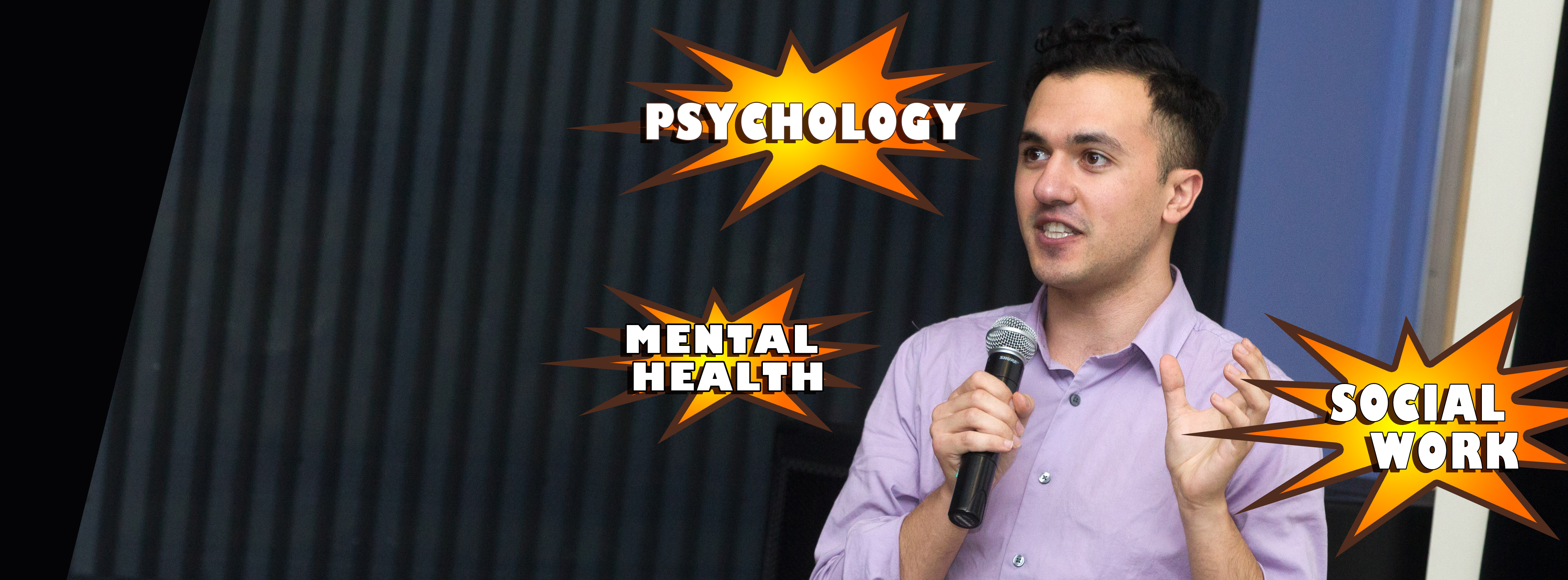Comics and mental health
BGSU alumnus creates unique career path

By Marie Dunn-Harris
Villains are one of the most important aspects of a comic book. Without them, there would be no superheroes. But why do villains do what they do?
“I study how mental health disciplines such as psychiatry, psychology, psychoanalysis and social work intersect with comics.”
Valentino Zullo, who received dual master’s degrees in English and women’s, gender and sexuality studies from BGSU, is using his combined knowledge base to study the psychological underpinning of villains in comics and apply what he learns to working with patients in mental health services.
“I’m both a social worker and a scholar,” Zullo said. “I study how mental health disciplines such as psychiatry, psychology, psychoanalysis and social work intersect with comics.”
Zullo recently returned to BGSU as a guest speaker at “Comic Books, Superheroes and Pop Culture,” sponsored by the Chapman Learning Community.
Zullo offers the example of the Joker from Batman. Everyone knows he’s psychotic, but no one really understands why.
“Diagnosis asks the question ‘What are you?’ whereas the superhero narrative asks the question ‘Where have you been?’ To understand that a villain has a traumatic history, it humanizes them. It doesn’t correct what they’ve done, nor does it justify it, but if they have a beginning, then they can also have an ending. They are not forever stuck doing what they do as villains,” he said.
Zullo uses this approach in working with mental health patients.
“We don’t want to give them pharmaceuticals and send them on their way, hoping that all will be better. Like the supervillain (and superheroes), if they have a history they can also have a future,” he said.
He is currently a student at the Mandel School of Applied Social Sciences at Case Western Reserve University, where he is working on his third master’s degree, in social work. He’s doing his field placement work at a VA clinic’s in-patient psychiatric ward, and training to be a psychoanalyst. Besides all of that, Zullo is also a guest lecturer at the Cleveland Public Library, where he started a monthly series to share his love of comics.
“I try to merge my investment in social welfare and social justice with my investment in literature and art,” he said.
Zullo received his undergraduate degree from Kent State University, where he met a professor who gave him the idea of studying comics. It wasn’t until he came to BGSU that he was able to pinpoint where he wanted to go with his degrees, thanks to the help of professors such as Dr. Jolie Sheffer, Dr. Erin Labbie, Dr. Kim Coates and Dr. Stephannie Gearhart.
“Additionally, several professors in the women’s studies department such as Dr. Lesa Lockford, really helped pull things together for me,” he said. “It fits in with social welfare and social well-being.”
He also credits his English faculty members with giving him the critical skills he needed in his field of study.
“I had wonderful professors in the English department who taught me critical and creative writing, thinking and speaking skills,” he said.
Zullo was able to combine those skills with his interests.
“I got the clinical skills in social work and I got the reading and writing skills from English. When I put the two together, something happens and I think it’s something interesting,” he said.
As for his future? He plans to merge his studies in comics, social work and psychoanalysis to become either a psychoanalyst or instructor.
“I want to be like a comic book, to do what they do. Comics are about bringing together art and text and something cool happens. So I want to bring two different things together like art and social welfare and see what happens.”
Updated: 12/02/2017 12:53AM
